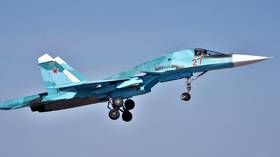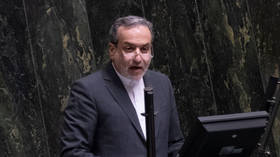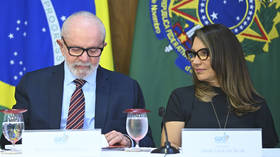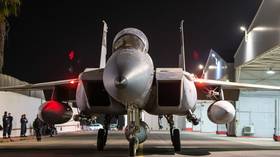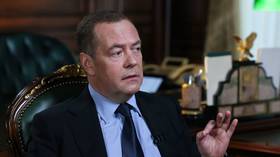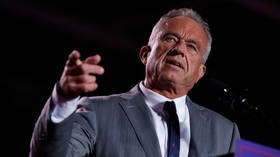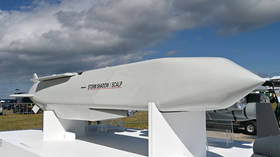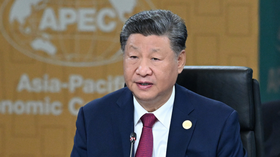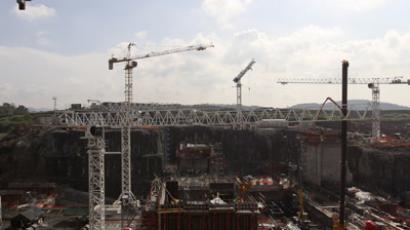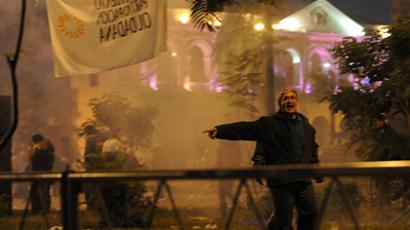‘Latin America needs independence to prosper’ – President of Nicaragua
Nicaraguan President Daniel Ortega believes Latin America requires freedom from external influence to flourish. For Nicaragua, this means building a canal for self-sustainability. He told RT that all this is possible as hegemony is in decline.
Ortega argues that the world needs multi-polarity. Moreover, it is already heading in that direction. The only option for hegemonic nations “is to change themselves, and to that end, they need to evolve, and to promote a world order that would be in line with international law, UN principles and the laws of international trade in a multi-polar world.”He also believes that capitalism has failed to resolve problems such as “unemployment and poverty.”He says that US “aid” equals “debt” and for Latin American nations to achieve prosperity they need independence. “Political independence is impossible without social and economic independence,” argues Ortega. “Today, a new reality is gradually emerging in Latin American and Caribbean nations. They have more freedom today to determine their future.”For Ortega’s country, this means first of all building a canal, which would “complement” the Panama Canal and would make Nicaragua self-sufficient by connecting the Caribbean to the Pacific. RT:Recently, Hugo Chavez won the presidential election in Venezuela and stayed in office. A year ago, the people of Nicaragua re-elected you for another term. Does this mean that socialism has proved its viability and is now established in Latin America?DO: The neoliberal model has failed. In other words, capitalism reached the highest stage, where it was expected to resolve all the economic and social problems overnight, resolve the problems of unemployment and poverty. But this model failed. It failed not only in Latin America; it is also failing in developed economies. Today we see it failing in the US and Europe. This is why people in our part of the world gladly embraced the idea of a radical change. Our countries need sovereignty and independence in every area. Political independence is impossible without social and economic independence. Today, a new reality is gradually emerging in Latin American and Caribbean nations. They have more freedom today to determine their future. President Hugo Chavez’s recent victory will definitely help Latin America and the Caribbean to continue on the path of change.RT:But this election has been the closest that Venezuela’s opposition has ever come to victory. Some say the people of Venezuela are tired of the present government. What do you make of it?DO: The truth is, a one-point advantage already counts as victory, in politics as well as in sports.There is no such thing as “a greater victory”. No matter if you are one point or a hundred points ahead, victory is victory. I think what we have seen in Venezuela was this: there had been considerable efforts invested to prevent Hugo Chavez from winning the election, but all in vain. I see it as a fiasco of the entire rightwing trend, which had been supported by the United States and Europe.RT:Following the toppling of President Fernando Lugo in Paraguay, there was speculation that we are into a new era of coups d’état. How likely do you consider such a scenario today?DO: In fact, we in Latin America have never managed to make coups a thing of the past, and I’m afraid this might never happen. I believe there will be an implicit threat of a coup as long as the conservative forces in the United States take interest in disrupting any development aimed at upsetting the current global hierarchy. These forces engage local groups in our countries in covert activities, and we have seen it happen across Latin America and the Caribbean.RT:So you think there is a connection between the events in Paraguay, the attempted coup in Ecuador and the military coups in Honduras?DO: Yes, that is a fact. Take the attempt at overthrowing President Chavez in Venezuela in April 2002, for example. Next came a coup in Honduras, aimed at hampering the development of a unified Latin America. Then there was an explicit and very forceful attempt at a coup in Bolivia, aimed against President Evo Morales.Then there was an attempted coup against President Raphael Correa in Ecuador. And most recently, the plot to force the Paraguayan president out of power.I think this will remain an implicit threat, but it will gradually lose in ability over time, due to the rising drive for change that we see gaining momentum in Latin America. This movement is based on respect for the will of the people, and this is what will make coups increasingly harder to pull off, time after time. Yet we shouldn’t rule out such a possibility altogether, not as long as we remain at odds with the forces that strive for global domination and believe that the world is supposed to bend the knee to them. They still don’t realize that we no longer live in an era of hegemony. So there will remain a hidden, latent menace for the time being.RT: In July 2012, the National Assembly of Nicaragua adopted a law to build a canal that would connect the Caribbean to the Pacific. This would not merely give a boost to the Nicaraguan economy, but actually promote your country to one of the region’s richest economies. When is the canal scheduled for completion?DO: Indeed, a vision of such a canal goes back as long as the history of Nicaragua.RТ:Five centuries?DO: Ever since the Spanish conquest. Later on, Great Britain rivaled with Spain for control of Nicaragua, thinking there was a natural waterway here. It sort of existed, by way of the San Juan River that springs from Lake Nicaragua. But one section was missing – a canal across the narrow isthmus of Rivas. Because of that, our country ended up in the middle of geopolitical disputes and became a target for US expansionist policies. Nicaragua lost all independence after a US invasion. But what’s important here is that this project has always been on the books. Over a century ago, the Americans themselves looked into building a canal in Nicaragua, but then they decided to invest in the Panama Canal. Once we became independent, we revisited this vision, and now we are working to make it real. We feel that the project is getting on track now. As a matter of fact, the region does need one more transit route. The Panama Canal cannot satisfy the current demand for international transportation, especially freight traffic. Even with a view to expanding the Panama Canal, which is currently underway, it will still leave a lot to be desired in terms of traffic speed and waiting time.Our canal would not serve to substitute the Panama Canal, but rather to complement it. There is similar logic here as in urban planning: the more roads you have in your city, the better the traffic. We are looking at providing our region with two major waterway routes instead of one. This would enhance the region’s transit capabilities, bring down transit costs and thus benefit global trade in general, serving not just our own interests as an economy, but those of the entire international community.For Nicaragua, it would also mean independence, giving us access to resources and the kind of revenues that would enable us to become entirely self-sufficient. As of now, we are a dependent economy. There is nothing wrong with interdependence and complementariness, but one-way dependency is bad for anyone.RТ: So when will Nicaragua finally get its chance?DO: Very soon, I hope. There is a lot of work being done. Chinese companies are in charge of the project, and we expect it to be accomplished rather quickly.RТ:It was initially expected to take ten years, if I’m not mistaken.DO: We think it is possible to get it done within a shorter period. The exact timeline will be determined by the companies involved in the project, once they assess its profitability and get down to construction. After that, we will have a better idea about the timeframe.RT:This year the United States has terminated its annual aid commitments to Nicaragua. How has that affected your country?DO: Nicaragua is highly vulnerable as an economy. Throughout our history, our economy has suffered at the hands of the US and its policies. The city of Granada, for example, was burnt to the ground, falling prey to America’s expansionist policies. All those wars and military invasions the US has sponsored or provoked. There has even been a ruling by the International Court of Justice, binding the United States to compensate Nicaragua for all our losses, but the US has ignored this verdict.Of course, the fact that the US has terminated what they call “aid” to Nicaragua has had negative consequences for our people and our country. But in reality, that was no aid. What the Americans call “aid” was really tiny installments in payment of the enormous debt the US owes to Nicaragua.That was no aid and no cooperation. That was merely an allowance they paid us, passing it for “aid” and “cooperation”.And it came with tight conditions attached, too. So we cannot talk of Nicaragua as a sovereign and independent nation as long as we remain critically dependent upon the United States and its current political trends, its prevalent frame of mind and the amount of influence radical groups enjoy there at any given moment of time. Because those are the groups that largely determine US foreign policies. They are the ones who contest in court all US cooperation programs with Nicaragua, and even call for using force against Latin American nations that dare stand up for our independence.That is why terminating any format of cooperation is bound to have a negative impact on Nicaragua. But that is exactly what makes it so important for us to ensure that our nation should no longer be dependent upon this sort of conditional cooperation with either the United States or the European Union.The US has essentially pursued a policy of racket vis-à-vis Nicaragua and its people. This is unfair and undemocratic. They are not supporting liberty, they are promoting servitude.This is what prompts us to get the canal done as soon as possible. It would relieve us of our present dependency upon the US and Europe and their hegemonic policies.RT:The United States is all set for a presidential election. What are Nicaragua’s expectations in this regard?DO: I believe this is an election where the American people should vote for their government to commit itself to a peaceful foreign policy agenda. That is what I see as most important. The best thing the United States could do for the world is pursue peace, not war. A policy of peace would enable the US to be more successful in addressing its domestic as well as global economic challenges – provided that they choose to seek an alternative to the neoliberal policies that were predominant among capitalist economies in recent years, and have proved to be such a failure.RT:What is your idea of a perfect world? And what role would you see in it for Latin America, the United States or Russia?DO: I am sure we are already heading that way, despite efforts from certain forces to prevent this kind of a change. I mean the American far-right, who won’t even tolerate a president such as Barack Obama: they denounce him merely because of his African origins and the color of his skin.Yet these forces grow ever weaker with time. The same is happening in Europe.Reality itself sends a signal to the nations that used to feel like they ruled the world until recently, telling them the world can no longer go on with hegemonic attitudes.It was reality that has shaped what we know today as a multi-polar world. And regardless of whether hegemonic powers choose to move along with the rest of the world, the world favors multi-polarity, and we are moving in that direction.We hope that those in power in the world’s most advanced economies will finally realize that the path they had been following, thinking it to be a path toward peace, stability, growth and development, has eventually brought them to the verge of disaster, and they are the ones heading toward a cliff.In the past, they used to drive us toward self-destruction, but this time, they are themselves set on a path to collapse. Their only option is to change themselves, and to that end, they need to evolve, and to promote a world order that would be in line with international law, UN principles and the laws of international trade in a multi-polar world.RT:So you believe this is reality rather than wishful thinking?DO: It is reality, I am sure of that. We already see it happening.


